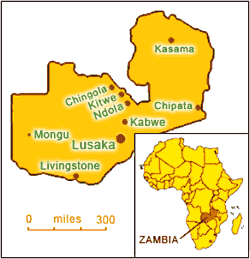Peer counselling in a rural setting: An example from Zambia
By Dr Ndangwa Noyo [7]
A peer counselling programme is being instituted in the Western Province of Zambia (formerly Barotseland), by youth volunteers under the aegis of the Young Women’s Christian Association (YWCA). This area is still steeped in deep cultural values and traditions, and has a long history of kingship as well as kinship systems. The former refers to institutions of traditional governance and political rule, whilst the latter describes familial ties such as the extended family.
HIV and AIDS advocacy work in Zambian rural areas has its own dynamics such as lack of resources and resistance from the traditionalists. However, peer education/advocacy seems to be gaining a foothold in the Western Province, particularly in Mongu, the provincial centre. Mongu is about 700 kilometres from the capital Lusaka.
 A map of Zambia showing the location of Mongu. |
Context
The HIV and AIDS pandemic has had devastating effects on Zambia and resulted in numerous deaths leading to the dislocation of families and communities. The AIDS crisis has also left many children without parents; a situation culminating in what is commonly known as the orphan crisis. In the Western Province alone, there were 81 098 orphans for a population of 818 450 in 2002 to 2003. [8]
With 16.5 per cent of people aged between 15 and 49 years living with the virus in 2003, the impact of the disease has been dramatic. It has also gone far beyond the individual level with all areas of the public sector and economy being weakened, and national development stifled. [9] Responses to HIV and AIDS in Zambia have for many years aimed to prevent HIV transmission; to care for those who are infected and affected; and to reduce the personal, social and economic impact of AIDS. [10] Preventative measures are also subsumed under campaigns and education, through public and private media, and other mediums such as drama and theatre, leaflets relating to condom use and information on sexually transmitted diseases.
The Western Province has a predominantly young population and it is therefore important to target this group in HIV education. Taking school attendance as a proxy indicator, there were 179 440 school going youth in the age range 14-18 in 2002 to 2003, accounting for 52 per cent of the total population of this cohort. [11]
The work of the YWCA in Mongu
The YWCA is overseeing three main programmatic areas: Women’s Human Rights, Economic Empowerment/Appropriate Technology, and Youth - Adolescent Reproductive Technology. It follows an integrated approach by addressing cross-cutting issues in a holistic way. Even though funding for different projects comes from different donors, conscious efforts are made by the organisation to approach issues in an integrated way. The peer counselling programme falls under the ambit of the Youth - Adolescent Reproductive Technology Programme. The YWCA, while using this Programme as a vehicle for intervention and change, has managed to do some wonderful work in the rural setting of Mongu.
This sub-programme operates by using groups of volunteers, especially the youth of Mongu. Youth are trained as peer counsellors or as peer educators in areas of sexuality. They are also deployed in strategic places or “friendly corners” where they engage with young people who are ignorant or afraid to use health facilities when they are infected by a sexually transmitted disease, for fear of being stigmatised. The initiative is implemented in partnership with the district health boards of the Province. The programme offers the following main services:
- counselling;
- the use of drama to convey reproductive health messages;
- distribution of pamphlets or written materials; and
- a resource centre where community members can access free information.
Many young men and women appreciate this service and feel that has a positive impact on their lives. However, the youth volunteers feel that cultural issues impede them from carrying out their work effectively as most elders are concerned and sensitive about their approach and the language they use while sensitising the youth about HIV and AIDS. For example, when condoms are mentioned as a preventative measure for sexually transmitted infections, there are stern reactions from the elders. [12] This is because the elders are more conservative and traditional when it comes to sex education in this area.
Nonetheless, the peer counselling programme has gathered momentum because it is user-friendly and destigmatises the HIV and AIDS issue and sexuality. Furthermore, it speaks directly to the needs, concerns and fears of the youth who are always marginalised in society. Indeed, the peer counselling programme serves to break down the barriers of silence and stigma associated with the pandemic.
Conclusion
The YWCA was only established in 1991 in Mongu, but has not been operating in the area for a long time. Today, however, there are some positive trends showing that the interventions undertaken by the organisation have begun to bear fruit. The peer counselling initiative is one example and the government has seen the programme’s benefits and has come on board via its district health boards.
[7] Dr Noyo is a former Senior Researcher at the Centre for Social Development in Africa, Department of Social Work, University of Johannesburg. He also served as Zambia’s in-country research leader for VOSESA’s five-country research project on civic service and volunteering.
[8] Central Statistical Office (2003) Living Conditions Monitoring Survey Report, 2002–2003. Central Statistical Office: Lusaka.
[9] AVERT.ORG (2005) HIV and AIDS in Zambia. The epidemic and its impact. Accessed at www.avert.org/aids-zambia.htm.
[10] Ibid.
[11] Central Statistical Office (2003).
[12] Kakenenwa M (2005) Personal interview.